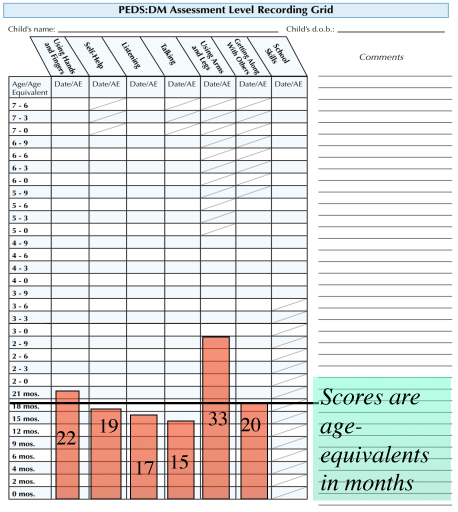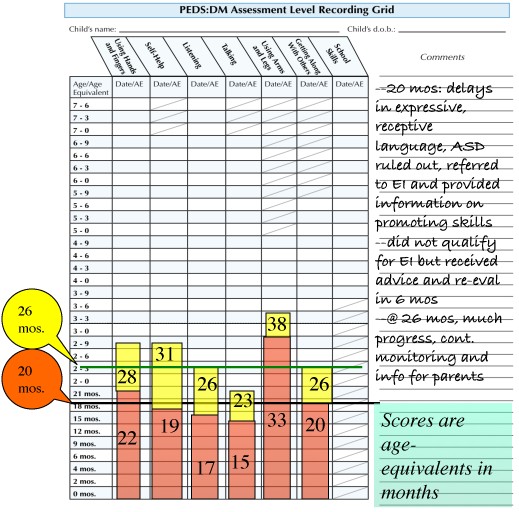Because of the expense, time, and often lengthy wait-times that accrue when a multi-disciplinary team administers diagnostic tools, triage clinics are ideal for reducing service bottle-necks. Triage clinics using assessment level tools like the PEDS:DM-Assessment Level®, provide a viable, swift and low-cost substitute for deciding whether services are needed and for monitoring progress. Many children can be seen in a single day, short reports are easily generated for referring providers and families, and for most States, assessment level tools provide essential eligibility criteria for early intervention services and monitoring. Triage services are popular with community health care providers and are more likely to at least “break-even” in terms of clinic cost/revenues than are diagnostic evaluation services.
Foster care intake is a challenge because long-term caretakers (e.g., biological parents) are rarely present and new foster parents and social workers lack a history of children’s skills and needs. Children in care are at high risk for developmental-behavioral/mental health problems and so require careful monitoring over time.

One approach is to use Parents' Evaluation of Developmental Status-Revised® (PEDS-R®) at intake through which social workers and foster parents can provide a “gist” view of children’s developmental-behavioral status. The PEDS:DM-AL® can then be sent home for completion at a later date, i.e., once foster parents have a chance to get to know their new child.
Nevertheless, some clinicians and researchers find that newly placed children are quite cooperative in the first few days of placement. A hands-on administration of the PEDS:DM-AL® works well in such cases (foster parent self-report administrations surely less so given the dearth of opportunity to observe children’s skills).
After foster parents have time to know a child better, report or interview administrations of the PEDS:DM-AL® can be used instead of directly eliciting children’s skills. Applications can include mailing the PEDS:DM-Assessment Level® booklet or interviewing foster parents at a follow-up visit.
In early education settings, screening with the PEDS:DM® (preferably along with PEDS-R® in order to ensure effective communication to/from parents) may be sufficient for viewing children’s skills and progress, and for determining children need a more careful evaluation. The PEDS:DM® Screening Level involves 6 - 8 questions, 1 per domain. It uses cutoffs set at the 16th percentile-meaning that when children perform poorly, there is a high chance of unmet milestones--boding ill for future school success, unless intervention is provided. When children have difficulty with age-appropriate items on the PEDS:DM® Screening Level and if time permits, performance on those items can be transferred to the PEDS:DM-Assessment Level® Booklets. This indicates a starting point for administration of needed additional items. Once completed, the PEDS:DM-Assessment Level® pinpoints strengths and weaknesses, offers in-depth monitoring, and helps with determination of early intervention eligibility.
PEDS-R® and/or PEDS:DM® Screening Level are the best way to start. Many school systems, when attempting to screen children before kindergarten/pre-kindergarten entrance, mail printed PEDS-R®/PEDS:DM® forms to families. We license translations at minimal cPost.
For users of PEDS Online®, we provide translations as part of the Online License agreement.
Most school systems and other assessment/screening services gather responses from families and then use PEDS Online® because it provides automated scoring, generates a data base, summary reports for parents, referral letters, etc. This saves the time required for hand-scoring, and improves accuracy of results. Further, PEDS Online®, as part of its license agreement, provides without extra charge, files (for PEDS-R®, PEDS:DM® and the M-CHAT if age appropriate.) The only drawback is that currently parents’ response must be translated into English before using the site.
After initial screening PEDS-R®, PEDS:DM® and the M-CHAT-R, if age appropriate, some school systems opt to further assess children with the PEDS:DM-Assessment Level® -- transferring parents’ responses on the PEDS:DM® Screening Level to the PEDS:DM-Assessment Level® and then completing the rest of the items in order to determine if additional evaluations are needed, and to follow children who are at risk over time.
In clinics serving children at elevated risk for developmental-behavioral problems (e.g., who were premature, have cardiac problems at birth or other biological problems, trauma-related challenges, who are referred because of suspected difficulties such as ADHD, or who have environmental/psychosocial risk), strengths and weaknesses are often acute. Thus it is ideal to probe strengths and weaknesses across domains in order to determine children’s needs for specialized services. Most subspecialty and referral clinics also need to provide longitudinal monitoring which can be accomplished easily with the PEDS:DM-Assessment Level®.
Better still is the combination of PEDS-R® and PEDS:DM-Assessment Level® because:

